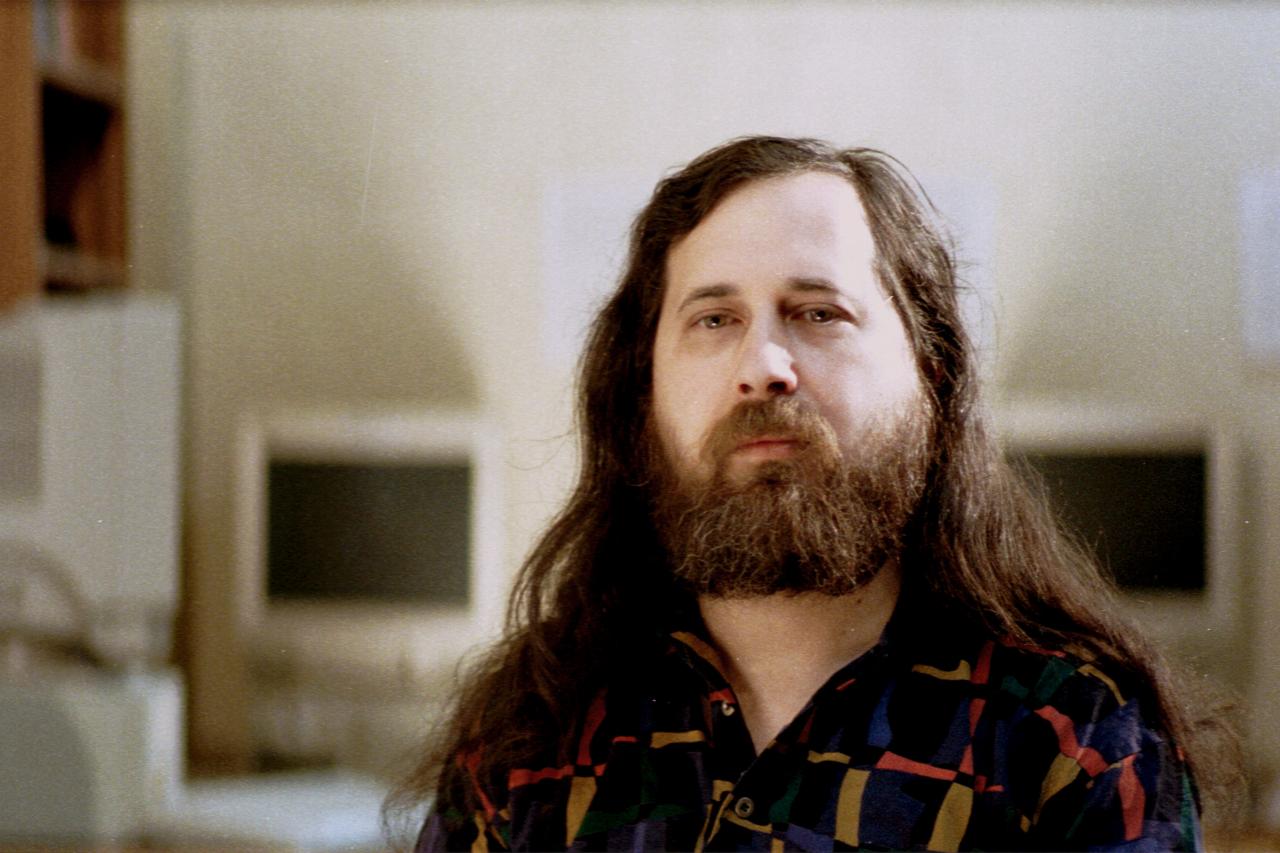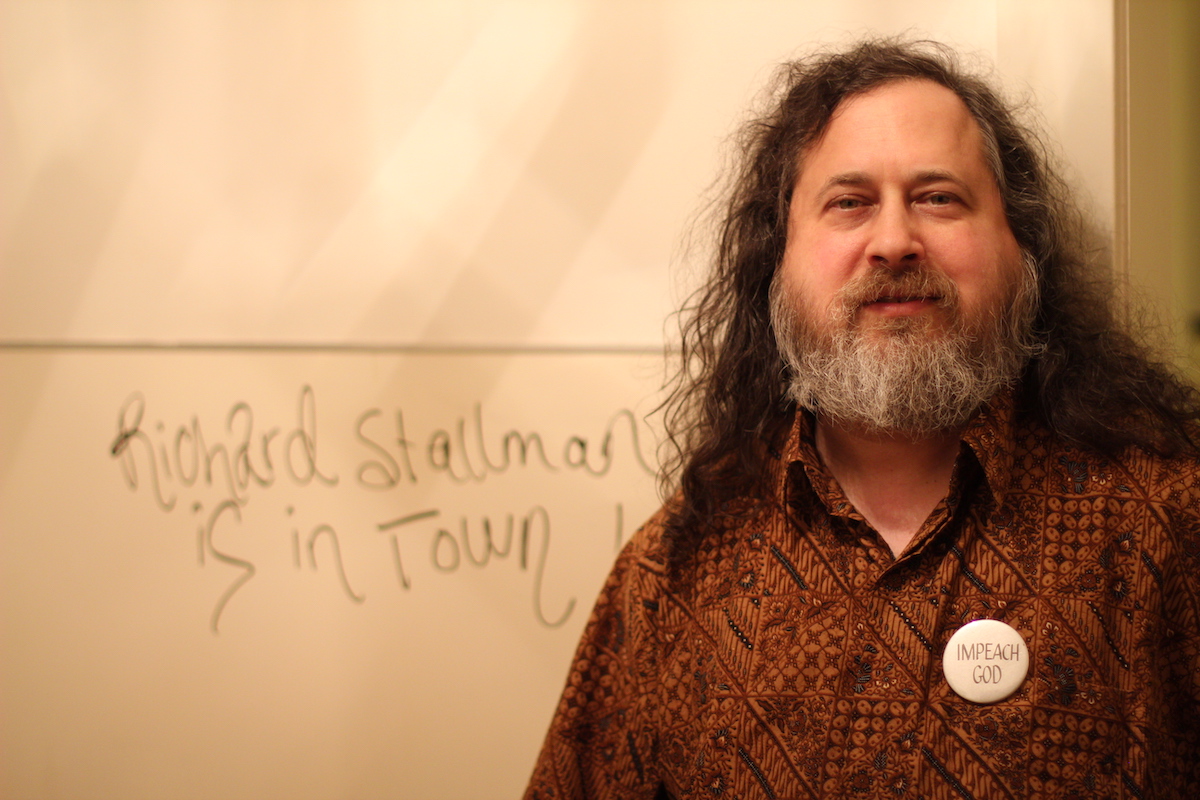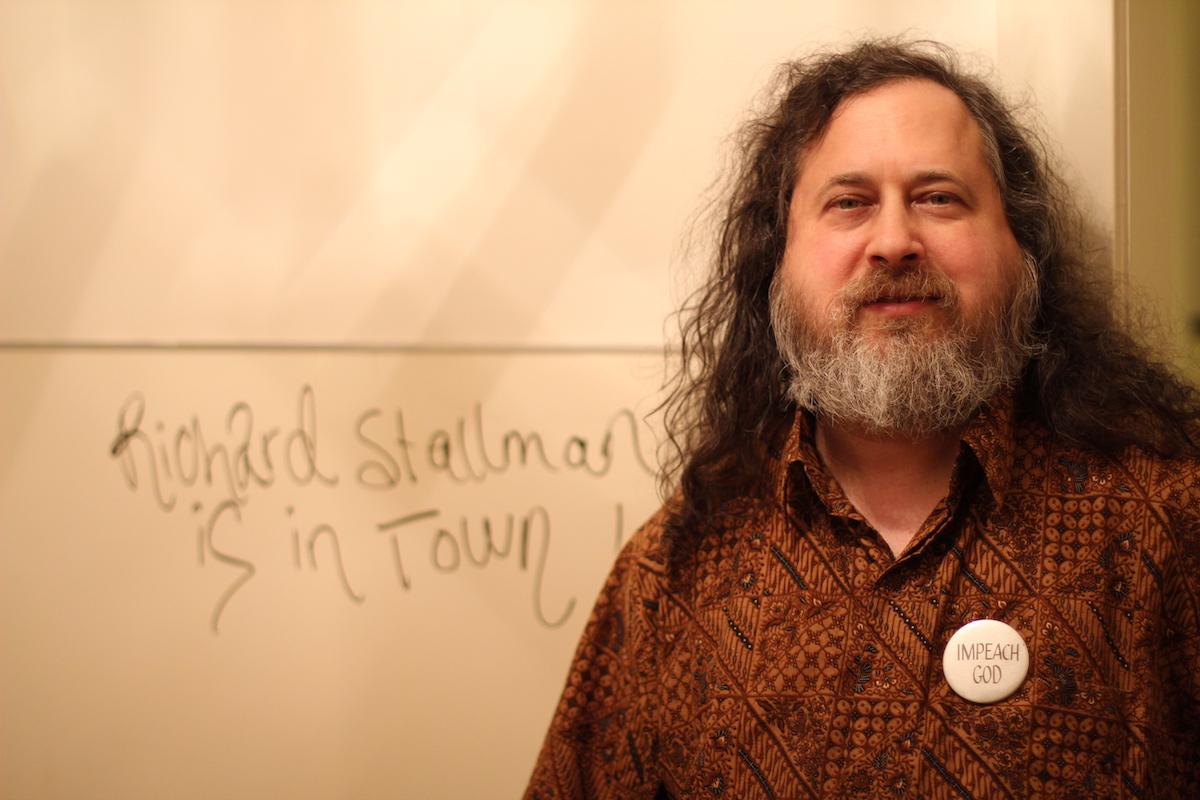Richard Stallman, a visionary figure in the world of computing, stands as the driving force behind the Free Software Movement. His unwavering commitment to software freedom and user rights has profoundly shaped the landscape of technology, fostering a collaborative and open approach to software development.
Table of Contents
From his early days at MIT, Stallman’s fascination with computer science blossomed into a profound belief in the importance of sharing knowledge and empowering users. He recognized the limitations of proprietary software and its potential to restrict innovation and individual freedom. This realization led him to launch the GNU Project, a monumental undertaking to create a complete free operating system.
Early Life and Education
Richard Stallman, a prominent figure in the free software movement, was born in 1953 in New York City. His upbringing and early experiences played a significant role in shaping his views on software freedom and his later contributions to the field of computer science.
Early Influences and Values
Stallman’s childhood was marked by a strong emphasis on intellectual curiosity and a belief in the importance of sharing knowledge. His father, a lawyer, instilled in him a deep respect for intellectual property rights, but also a belief that knowledge should be freely accessible. These values would later inform Stallman’s advocacy for free software.
Academic Background
Stallman attended the prestigious Massachusetts Institute of Technology (MIT), where he pursued his undergraduate studies in physics. He graduated in 1974 with a Bachelor of Science degree. His academic journey at MIT exposed him to the world of computers and programming, sparking his interest in the field.
Early Encounters with Computing
Stallman’s early encounters with computing were shaped by the collaborative spirit prevalent in the early days of computing. He witnessed firsthand the power of shared knowledge and the benefits of open collaboration. These experiences solidified his belief that software should be free and open to all.
Early Contributions to Free Software
While at MIT, Stallman began working on the development of software tools and utilities that would later form the foundation of the GNU project. He contributed significantly to the development of the Emacs text editor, which remains a popular and influential tool for programmers and writers.
The Birth of the Free Software Movement

The Free Software Movement, a cornerstone of modern computing, emerged from the visionary ideas of Richard Stallman, who saw a future where software was free to use, share, and modify. This movement, born out of a deep commitment to user freedom and collaboration, has profoundly shaped the technological landscape, influencing everything from operating systems to programming languages.
The Seeds of a Movement
Stallman’s journey towards the Free Software Movement began in the early 1980s at the Massachusetts Institute of Technology (MIT). Witnessing the rise of proprietary software and the limitations it imposed on users, Stallman became increasingly concerned about the erosion of user freedom and the stifling of innovation. He saw a future where software was treated as a tool for control rather than empowerment. This sparked his determination to create a world where software was truly free.
The Four Freedoms
The Free Software Movement is founded on four key freedoms, which define the essence of software freedom:
- The freedom to run the program as you wish, for any purpose. This freedom ensures that users are not restricted in their use of software and can adapt it to their specific needs.
- The freedom to study how the program works and change it to make it do what you wish. This freedom empowers users to understand and modify software, allowing them to fix bugs, improve performance, and enhance functionality.
- The freedom to redistribute copies so you can help your neighbor. This freedom promotes collaboration and sharing, enabling users to distribute software freely and help others benefit from its use.
- The freedom to distribute copies of your modified versions to others. This freedom allows users to share their improvements and innovations with the community, fostering a culture of open development and continuous improvement.
The GNU Project
In 1983, Stallman launched the GNU Project, a monumental undertaking aimed at creating a complete free operating system, a core component of the Free Software Movement. The GNU Project sought to provide an alternative to proprietary operating systems, ensuring users had the freedom to control their computing experience. This project was a testament to Stallman’s vision and commitment to user freedom.
The GNU Project was a collaborative effort, bringing together a global community of developers who shared Stallman’s vision. Over time, the GNU Project developed a range of free software components, including the GNU Compiler Collection (GCC), the GNU Bash shell, and the GNU Emacs editor, which became essential tools for programmers and users alike.
The GNU Project, with its commitment to free software principles, laid the foundation for a thriving ecosystem of free software and paved the way for the development of the Linux kernel, which, combined with GNU tools, formed the basis of the GNU/Linux operating system.
The GNU Operating System: Richard Stallman
The GNU Operating System, often shortened to GNU, is a free software operating system developed by the GNU Project, founded by Richard Stallman in 1983. Stallman’s vision was to create a complete Unix-like operating system entirely composed of free software, ensuring users had the freedom to run, study, share, and modify the software. The GNU Project aimed to address the limitations of proprietary software, which often restricted users’ rights and control over their computing experience.
Key Components of the GNU Operating System
The GNU Operating System comprises numerous essential components, including:
- GNU Coreutils: A collection of basic utilities that provide fundamental command-line tools for file manipulation, text processing, and system administration.
- GNU Bash: A powerful command-line interpreter that enables users to interact with the operating system through commands.
- GNU GCC: A versatile compiler that translates source code written in programming languages like C, C++, and Fortran into machine-readable instructions.
- GNU Emacs: A highly extensible and customizable text editor known for its extensive features and ability to handle complex tasks.
- GNU Make: A build automation tool that automates the process of compiling and linking software projects.
- GNU Binutils: A suite of tools used for linking, assembling, and manipulating object files.
These components, along with many others, form the core of the GNU Operating System, providing a comprehensive set of tools for users and developers.
The Importance of the GNU Operating System in Promoting Software Freedom
The GNU Operating System played a pivotal role in promoting software freedom by providing a complete and functional operating system built entirely on free software principles. This meant users could freely access, study, modify, and distribute the software, fostering a collaborative and open environment for development and innovation. The GNU Operating System’s impact on the software industry is significant, as it demonstrated the viability of free software alternatives to proprietary systems. It inspired the creation of other free software projects and fostered a community dedicated to promoting software freedom.
Comparing the GNU Operating System to Other Operating Systems
The GNU Operating System stands out from other operating systems due to its commitment to software freedom and its unique features:
- Software Freedom: The GNU Operating System emphasizes user freedom, allowing users to modify and redistribute the software without restrictions. This contrasts with proprietary operating systems that often restrict user rights and control over the software.
- Open Source Development: The GNU Operating System’s development process is open and transparent, encouraging community involvement and collaboration. Users can contribute to the development of the software, fostering a diverse and innovative ecosystem.
- Portability: The GNU Operating System is designed to be highly portable, running on various hardware platforms. This flexibility allows users to utilize the operating system on different devices and architectures.
- Customization: The GNU Operating System provides extensive customization options, allowing users to tailor their operating system to their specific needs and preferences.
These unique features distinguish the GNU Operating System from other operating systems, emphasizing its commitment to software freedom, open development, and user empowerment.
The Rise of the Free Software Foundation
In 1985, Stallman, driven by his unwavering belief in software freedom, established the Free Software Foundation (FSF). This non-profit organization became the central hub for the free software movement, dedicated to promoting and protecting the rights of users to access, use, modify, and distribute software freely.
The FSF plays a pivotal role in advocating for software freedom by promoting the GNU General Public License (GPL), a legal framework that ensures the freedom of users to modify and distribute software.
The Free Software Foundation’s Initiatives and Projects
The FSF has been instrumental in developing and supporting numerous initiatives and projects that contribute to the free software ecosystem.
- GNU Project: The FSF’s flagship project, the GNU Project, aims to create a complete free software operating system. This ambitious undertaking has yielded essential tools like the GNU Compiler Collection (GCC), the GNU Bash shell, and the GNU Emacs editor, all of which are fundamental components of modern operating systems.
- GNU/Linux: While the FSF primarily focused on developing the GNU operating system, the integration of Linus Torvalds’ Linux kernel in 1992 resulted in the widely used GNU/Linux operating system. This collaboration exemplifies the power of free software and its ability to foster innovation through collaboration.
- Software Freedom Law Center: The FSF established the Software Freedom Law Center (SFLC) to provide legal support and resources to individuals and organizations fighting for software freedom. The SFLC actively engages in legal battles against software patents and copyright restrictions that threaten user freedoms.
- Free Software Directory: The FSF maintains the Free Software Directory, a comprehensive database of free software programs and projects. This directory serves as a valuable resource for users seeking free and open-source alternatives to proprietary software.
- Free Software Foundation Europe: To expand its reach and influence, the FSF established the Free Software Foundation Europe (FSFE) in 2001. The FSFE focuses on promoting free software and advocating for software freedom within Europe.
Stallman’s Philosophical Views

Richard Stallman’s philosophical views are deeply intertwined with his advocacy for free software and his critique of intellectual property and technology. These views have shaped his activism and profoundly influenced the development of the free software movement.
Software Freedom
Stallman believes that software should be free in the sense of freedom, not price. He argues that users should have the freedom to run, study, share, and modify software. This freedom, he asserts, is essential for users to control their technology and ensure its ethical use.
Stallman’s concept of software freedom is embodied in the four freedoms of free software:
- The freedom to run the program, for any purpose.
- The freedom to study how the program works, and change it to make it do what you wish.
- The freedom to redistribute copies so you can help your neighbor.
- The freedom to distribute copies of your modified versions to others.
Stallman’s views on software freedom are rooted in his belief that users should have control over their technology. He sees proprietary software as a threat to this control, arguing that it restricts users’ ability to modify and adapt software to their needs.
Intellectual Property
Stallman is a vocal critic of intellectual property laws, particularly copyright and patents. He argues that these laws stifle innovation by granting exclusive rights to individuals or corporations, preventing others from building upon existing work. He believes that intellectual property laws are antithetical to the principles of free software, which promotes collaboration and sharing.
Stallman’s views on intellectual property are controversial, particularly in the technology industry, where intellectual property is often seen as a key driver of innovation. However, his arguments have resonated with many in the free software community, who see intellectual property as a barrier to collaboration and progress.
Technology and Society
Stallman is concerned about the impact of technology on society. He believes that technology should be used to benefit humanity, not to control or exploit people. He is critical of technologies that he believes are harmful, such as surveillance technologies and proprietary software that limits user freedom.
Stallman’s views on technology are often seen as utopian, but he believes that technology can be used to create a more just and equitable society. He advocates for the development of technologies that promote freedom, privacy, and collaboration.
Stallman’s Legacy and Impact
Richard Stallman’s influence on the world of computing and technology is undeniable. His unwavering commitment to software freedom has shaped the landscape of software development and user rights, leaving a lasting impact on the digital world.
The Open Source Revolution
Stallman’s work laid the foundation for the open source movement, which advocates for freely accessible and modifiable software. The GNU project, spearheaded by Stallman, created a complete operating system composed of free software, challenging the proprietary software model prevalent at the time. This movement, inspired by Stallman’s ideals, has profoundly impacted the development of software, fostering collaboration, innovation, and accessibility.
Software Freedom and User Rights
Stallman’s philosophy of software freedom centers on the belief that users have the right to control their software. He argues that users should be able to freely use, study, share, and modify software, empowering them to adapt and improve it according to their needs. This philosophy has had a profound impact on the development of software licenses, such as the GNU General Public License (GPL), which ensures that software remains free and accessible to all.
Controversies and Criticisms

Richard Stallman, a prominent figure in the free software movement, has faced significant controversies and criticisms throughout his career. These controversies have stemmed from his outspoken views on various issues, including intellectual property, technology, and social justice. While Stallman’s advocacy for free software has garnered widespread support, his personal views and actions have often been met with criticism, leading to debates about his ethics and the impact of his stances on the movement he helped build.
Stallman’s Views on Intellectual Property
Stallman’s unwavering belief in the importance of free software has led him to be a vocal critic of intellectual property rights, particularly copyright law. He argues that copyright restricts the freedom of users to share, modify, and improve software, hindering innovation and collaboration. This stance has drawn criticism from those who argue that copyright is essential for incentivizing software development and protecting the rights of creators.
“Copyright is a form of censorship. It is a way of preventing people from sharing information and ideas.” – Richard Stallman
Stallman’s criticism of intellectual property extends beyond software. He has also been critical of patents, arguing that they stifle innovation and hinder the development of new technologies.
Ethical Concerns Regarding Stallman’s Actions
In recent years, Stallman has faced criticism for his handling of allegations of sexual harassment within the free software community. In 2019, he resigned from the Free Software Foundation (FSF) following accusations of inappropriate behavior and his defense of convicted sex offender Marvin Minsky. These events sparked a debate about the role of ethics in the free software movement and the impact of Stallman’s actions on its reputation.
Impact on the Free Software Movement, Richard stallman
The controversies surrounding Stallman have had a significant impact on the free software movement. Some argue that his actions have alienated potential supporters and damaged the movement’s reputation, making it more difficult to achieve its goals. Others maintain that the movement should not be defined by the actions of one individual and that Stallman’s contributions to free software remain invaluable.
The debate surrounding Stallman’s legacy and the impact of his controversies continues to be a complex and sensitive issue within the free software community.
Stallman’s Influence on the Future of Technology
Richard Stallman’s visionary ideas and unwavering dedication to free software have profoundly shaped the technological landscape, and his influence continues to resonate deeply in the ongoing evolution of technology. His advocacy for user freedom, ethical considerations, and the importance of open source development has inspired countless individuals and organizations to embrace a more equitable and accessible digital world.
The Future of Artificial Intelligence
Stallman’s views on artificial intelligence (AI) are rooted in his core belief that technology should serve humanity and not the other way around. He has expressed concerns about the potential dangers of unchecked AI development, particularly in areas like autonomous weapons systems. Stallman advocates for AI systems that are transparent, accountable, and designed with ethical considerations at their core. He believes that AI should be developed and deployed in a way that prioritizes human values and safeguards against potential harm.
Key Projects and Contributions
Richard Stallman’s dedication to the free software movement has resulted in a wide range of impactful projects that have shaped the landscape of computing. His contributions extend beyond individual programs, encompassing the development of operating systems, programming languages, and foundational software tools. These projects serve as pillars of the free software ecosystem, empowering users with freedom and control over their technology.
Key Projects and Contributions
Stallman’s contributions to the free software movement are vast and varied, ranging from the development of essential software tools to the establishment of foundational organizations. Here is a table outlining some of his most notable projects and contributions:
| Project Name | Description | Year | Significance |
|---|---|---|---|
| GNU Compiler Collection (GCC) | A collection of compilers for various programming languages, including C, C++, Fortran, and Ada. | 1987 | GCC became the primary compiler for the GNU system and has since been adopted by numerous operating systems, including Linux and Android. Its portability and efficiency have made it a cornerstone of software development. |
| Emacs | A highly customizable and extensible text editor known for its extensibility and powerful features. | 1976 | Emacs has evolved into a powerful development environment, widely used by programmers, writers, and researchers. Its customization options and extensibility have made it a versatile tool for a wide range of tasks. |
| GNU Operating System | A free and open-source operating system developed as an alternative to proprietary systems like Unix. | 1983 | The GNU system provided a foundation for the development of Linux, which has become one of the most widely used operating systems globally. Stallman’s vision for a free operating system laid the groundwork for the free software movement. |
| Free Software Foundation (FSF) | A non-profit organization dedicated to promoting and protecting the freedom of software users. | 1985 | The FSF has played a crucial role in advocating for free software principles, developing legal frameworks, and supporting the development of free software projects. Its efforts have contributed significantly to the growth and adoption of free software. |
Quotes and Sayings
Richard Stallman’s words have resonated with countless individuals, inspiring them to embrace software freedom and challenge the status quo. His quotes encapsulate his core beliefs and provide a glimpse into his unwavering dedication to user rights and the ethical use of technology.
Notable Quotes
Stallman’s pronouncements are often insightful and thought-provoking. His quotes capture the essence of his philosophy and highlight the importance of software freedom.
“Free software is a matter of liberty, not price. To understand the concept, you should think of ‘free speech’, not ‘free beer’.”
This quote emphasizes that software freedom is about having the right to use, study, modify, and share software, not simply about its cost.
“The purpose of software is to serve users, not to dominate them.”
Stallman advocates for software that empowers users, not software that restricts their choices or controls their actions.
“If you don’t control your own computer, you don’t control your own life.”
This quote underscores the importance of having control over the technology we use, as it impacts our lives in countless ways.
“The ethical issue is not the cost of copying, but the right to copy.”
Stallman argues that the focus should be on the fundamental right to copy and share software, not on the economic implications of doing so.
“Software is a means to an end, not an end in itself.”
Stallman emphasizes that software should be a tool that helps us achieve our goals, not a goal in itself.
Stallman’s Impact on Open Source Communities
Richard Stallman’s vision of a world where software is free for all to use, modify, and share has profoundly shaped the open-source movement. His ideas have fostered a collaborative environment where developers worldwide contribute to creating and improving software, making it accessible to everyone.
The Foundation of Open Source
Stallman’s advocacy for free software laid the groundwork for the open-source movement. He argued that software should be treated like a book, allowing users to freely copy, modify, and distribute it. This principle, known as “copyleft,” became the cornerstone of the open-source movement. It ensures that software remains free and open for everyone to use and contribute to, fostering a spirit of collaboration and innovation.
Concluding Remarks
Richard Stallman’s legacy extends far beyond the technical achievements of the GNU Project. His unwavering advocacy for software freedom has inspired countless individuals and organizations to embrace open source principles. His work has fostered a collaborative spirit within the tech community, empowering users and developers to work together to create a more equitable and accessible digital world.
Richard Stallman, the renowned advocate for free software, has always championed user freedom and control over technology. While his focus is on open-source operating systems like GNU/Linux, he’d likely acknowledge the need for tools that enhance user experience. For Windows users, a youtube downloader for windows 10 could provide a way to access and enjoy content offline, a principle Stallman might find appealing in its potential for empowering users.

